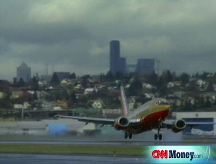Cutbacks brighten airlines' financial picture
Special charges push carriers deep into red, but better-than-expected operating results drive stocks higher.
NEW YORK (CNNMoney.com) -- The service cuts that have caused so much frustration for passengers are starting to help the airlines.
The stock of AMR Corp., parent of No. 1 U.S. carrier American Airlines, and No. 3 U.S. carrier Delta Air Lines soared Wednesday after they reported hefty losses - primarily from fuel-related costs - that nonetheless beat the dire expectations of Wall Street.
Delta (DAL, Fortune 500) surged 23% and AMR (AMR, Fortune 500) enjoyed a 29% increase. The stock surge represents rare good news for the carriers: Without those gains, the stocks for both companies have plunged 69% year-to-date.
AMR reported total operating revenue of nearly $6.2 billion for the second quarter, up 5% from $5.9 billion for the same period last year. The company exceeded revenue projections from Thomson FirstCall's analyst consensus, but just barely.
AMR reported a net loss of $1.4 billion, or $5.77 per share, for the second quarter. Excluding more than $1.1 billion in charges related to the writedown of discontinued airplanes and severance costs, the net loss was $284 million for the quarter, or $1.08 per diluted share.
That was not as bad as the $1.40 per share loss projected by Thomson First Call's analyst consensus. But it's a lot worse than American's performance in the year-earlier quarter, when the carrier reported a profit of $1.28 per share, or $1.08 including charges.
American Airlines, like many other carriers, blamed escalating fuel costs for its financial woes. The company said it paid $838 million more for fuel in the second quarter, compared to last year.
"Our company continues to be severely challenged by the fuel crisis that has afflicted our entire industry, and we expect these difficulties to continue for the foreseeable future," said AMR Chief Executive Gerard Arpey, in a press release.
Later, in an analyst call, Arpey said, "While times are certainly tough in the airline business, we have faced and met similar challenges in the past, and will do so again."
Also, AMR chief financial officer Thomas Horton said the company is delaying its sale of carrier American Eagle until market conditions stabilize.
Delta overcame a spike in fuel costs to report better-than-expected operating income Wednesday, although a special charge resulted in a large net loss.
Delta reported income of $137 million, or 35 cents per share, for the second quarter, excluding special charges and despite a $1 billion year-to-year increase in fuel costs. That was more than triple the 10 cents per share projected by analyst consensus provided by Thomson First Call.
Making a profit "is not something that all of our competitors will be able to report," said Delta Chief Executive Richard Anderson. "It's a testament to all the hard work of the people at Delta Air Lines."
Including special charges of $1.2 billion, Delta said its net loss for the second quarter was $1 billion, or $2.64 per diluted share.
Delta also reported total operating revenue of nearly $5.5 billion for the second quarter, a 10% increase from the year-earlier total of $5 billion. The carrier beat the Thomson consensus revenue estimate of nearly $5.4 billion.
Like many other U.S. carriers, Atlanta-based Delta is offsetting its soaring fuel costs by cutting capacity, meaning that it is discontinuing or reducing its least fuel-efficient flights to save money. Delta said it expects domestic capacity to decrease 13% in the second half of 2008, while increasing international capacity by 14%. Overall, capacity would decline by 4%, the airline said.
Delta said ramping up its international presence and hedging fuel costs allowed it to offset some $3 billion of the estimated $4 billion of higher fuel costs in 2008.
"The fact that we mitigated nearly 80% of the impact of higher fuel cost this quarter while improving our liquidity is a testament to both the strength of our action plan and the can-do spirit of the Delta people," said Delta president and chief financial officer Edward Bastian, in a press release.
Delta said it plans to have $3.2 billion in liquid assets by year's end.
Bastian said that fuel-hedging alone accounted for savings of $313 million. In addition, Bastian said the airline plans to ground 100 of its least fuel-efficient airplanes by year's end and hinted that there might be more.
"I'd expect there to be some potential for some additional mainline reductions," said Bastian.
Delta also said it expects its merger with Northwest Airlines (NWA, Fortune 500) to be completed in the fourth quarter. It said it expects this merger to result in about $2 billion in annual cost savings by 2012, but the acquisition would also cost $600 million over three years.
Between American and Delta in annual sales is the No. 2 carrier, UAL Corp.'s (UAUA, Fortune 500) United Airlines. ![]()



